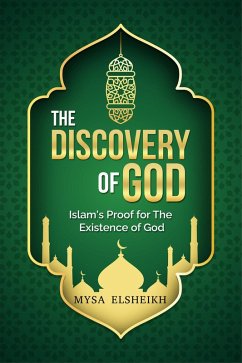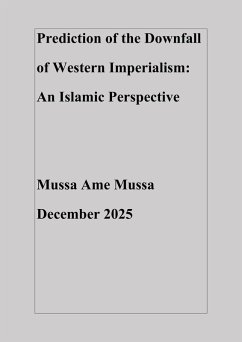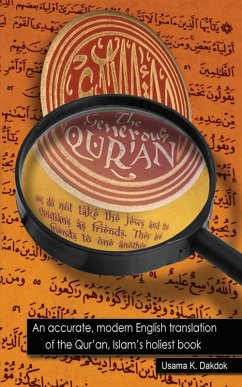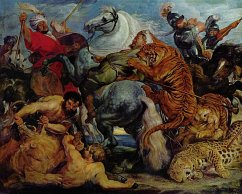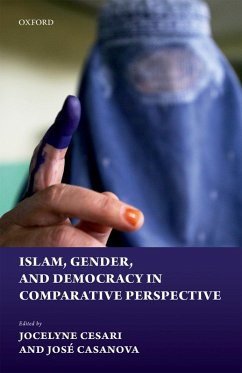
A CHRISTIAN PERSPECTIVE ON ISLAM'S ORIGINS (eBook, ePUB)
Its Religion, Founder, an Practices
Versandkostenfrei!
Sofort per Download lieferbar
7,99 €
inkl. MwSt.
Weitere Ausgaben:

PAYBACK Punkte
4 °P sammeln!
A BRIEF SYNOPSIS OF A CHRISTIAN PERSPECTIVE ON ISLAMAfter several interactions with Muslims of distinct sects in the Bronx community, NYC schools, and the workplace through the decades, Aryeh observed how some professing Christians were led to believe in the Islamic claim of Muhammad's legitimacy as a prophet. Although a few maintained the belief that Jesus remained holy as a "prophet," they suggested he was a mere man and abandoned their past confessions regarding his divinity. Nevertheless, the more astounding claim many ex-Christians and Muslims made suggested that the Jewish and Christian ...
A BRIEF SYNOPSIS OF A CHRISTIAN PERSPECTIVE ON ISLAM
After several interactions with Muslims of distinct sects in the Bronx community, NYC schools, and the workplace through the decades, Aryeh observed how some professing Christians were led to believe in the Islamic claim of Muhammad's legitimacy as a prophet. Although a few maintained the belief that Jesus remained holy as a "prophet," they suggested he was a mere man and abandoned their past confessions regarding his divinity. Nevertheless, the more astounding claim many ex-Christians and Muslims made suggested that the Jewish and Christian God found in the Bible identified as the same deity of the Qur'an. Hence, these claims above initiated the primary reasons for delving deep into the study of Islam and writing this book for the sake of not only reaching many believers who erred from Christianity but the Muslims who believed that Allah identified as the God of the Jews and Christians. Indeed, the enormous task of disproving Islam as an extension of the Abrahamic faith required many investigations into the questions raised by such astonishing claims. This book makes deep inquiries into the historical and theological assertions found in the Islamic faith concerning Allah, Muhammad, and the religious practices observed today, which have survived for little over fourteen centuries.
Consequentially, the unfortunate misconceptions taught about Islam in many church pulpits since the early days of this researcher's youth stemmed from books found in academia and some Christian libraries, which promoted a worldwide narrative by selective, favorable historical accounts based on political ideologies instead of rigorous theological investigation. The Christian perspective on Islam examines the theological origins of the Islamic faith by first investigating the geographical locations alleged as the nascent religion's early beginnings by exploring the historical and societal development of the Arab peoples. Second, this book probes the legitimacy of Muhammad as a divinely ordered prophet by consulting the Judaic traditions derived from the Jewish Scriptures explaining the qualifications of authentic prophethood. Finally, the sequential order of inquiry laid out above will highlight the emergence of the theology and residual religious rituals observed today in the Islamic world, and therefore, conclusively demonstrate that Islam remains unaligned with its Jewish and Christian predecessors.
After several interactions with Muslims of distinct sects in the Bronx community, NYC schools, and the workplace through the decades, Aryeh observed how some professing Christians were led to believe in the Islamic claim of Muhammad's legitimacy as a prophet. Although a few maintained the belief that Jesus remained holy as a "prophet," they suggested he was a mere man and abandoned their past confessions regarding his divinity. Nevertheless, the more astounding claim many ex-Christians and Muslims made suggested that the Jewish and Christian God found in the Bible identified as the same deity of the Qur'an. Hence, these claims above initiated the primary reasons for delving deep into the study of Islam and writing this book for the sake of not only reaching many believers who erred from Christianity but the Muslims who believed that Allah identified as the God of the Jews and Christians. Indeed, the enormous task of disproving Islam as an extension of the Abrahamic faith required many investigations into the questions raised by such astonishing claims. This book makes deep inquiries into the historical and theological assertions found in the Islamic faith concerning Allah, Muhammad, and the religious practices observed today, which have survived for little over fourteen centuries.
Consequentially, the unfortunate misconceptions taught about Islam in many church pulpits since the early days of this researcher's youth stemmed from books found in academia and some Christian libraries, which promoted a worldwide narrative by selective, favorable historical accounts based on political ideologies instead of rigorous theological investigation. The Christian perspective on Islam examines the theological origins of the Islamic faith by first investigating the geographical locations alleged as the nascent religion's early beginnings by exploring the historical and societal development of the Arab peoples. Second, this book probes the legitimacy of Muhammad as a divinely ordered prophet by consulting the Judaic traditions derived from the Jewish Scriptures explaining the qualifications of authentic prophethood. Finally, the sequential order of inquiry laid out above will highlight the emergence of the theology and residual religious rituals observed today in the Islamic world, and therefore, conclusively demonstrate that Islam remains unaligned with its Jewish and Christian predecessors.
Dieser Download kann aus rechtlichen Gründen nur mit Rechnungsadresse in A, D ausgeliefert werden.







